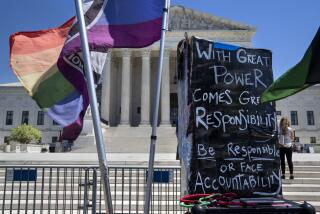Stanford student goes to Supreme Court to fight for her moms
Kinsey Morrison, a freshman at Stanford University, is going to the Supreme Court on Tuesday to speak up for her parents, and the stable, loving household they provided for her and her two sisters.
Growing up in Kentucky, she recalled, “I was often the only one of my friends whose parents weren’t divorced.”
Her two moms have been engaged for 20 years, she says. Whether they can legally marry at last, depends on how the justices rule in four cases to be argued on Tuesday, including one from Kentucky.
“They will definitely get married this summer,” she said, if the Supreme Court rules in favor of marriage equality.
The 18-year-old decided to speak up last year after the 6th Circuit Court in Cincinnati upheld laws in Kentucky, Michigan, Ohio and Tennessee that limited legal marriage to one man and one woman. She was angered her parents would continue to be viewed as second-class citizens. And she was disturbed by the hypocrisy that often goes with the talk of “traditional marriage.”
“Tomorrow, I could marry a stranger, divorce him in 72 days like Kim Kardashian, and get married five more times after that, like both my straight grandmother and straight grandfather did,” she wrote in an op-ed piece she sent to the Louisville Courier-Journal. “Yet my moms, who promised each other forevers two decades ago, who have raised three children and built their lives together, who embody the sanctity of a life-long commitment every day--they cannot get married.”
She then produced a home video called “Sanctity” in which she and her sisters, Jillian and Teagan, talk about their mothers, Karen and Audrey Morrison. Her video caught the attention of the Family Equality Council, a group that works with the children of gay parents to promote marriage equality.
With the help of several lawyers, the family and the council sent the Supreme Court a friend-of-the court brief. The Stanford freshman will also be the youngest speaker at a rally outside the court Tuesday to call for same-sex marriages to be legalized nationwide.
The welfare of children has become one of the central, most contested issues in the fight over marriage laws. Defenders of the traditional definition of marriage have insisted that raising children in a home with both their biological mother and father is the best option.
Such a version of the traditional family, however, is not what millions of American children experienced in recent decades. The rates of divorce and single-parent households soared after the 1960s, long before same-sex marriage became a legal reality anywhere in the nation.
These days, as many as 250,000 children are being raised by same-sex couples, according to data compiled by UCLA’s Williams Institute, a research center.
Such families include two nurses, April DeBoer and Jayne Rowse, who are raising four foster children in Michigan. One child was born so prematurely he was not expected to live. All were abandoned or given up by their biological mothers. And while Michigan entrusted the women to raise these vulnerable children, it would not allow them to adopt them jointly. Nor would it permit them to marry. That prompted their lawsuit, one of the four to be considered Tuesday.
In ruling against them, two judges of the 6th Circuit agreed with the state’s lawyers who said marriage is designed to further “responsible procreation” by couples of the opposite sex. Dissenting Judge Martha Daughtrey focused on the plight of the four children being raised by the two nurses.
“How ironic that irresponsible, unmarried, opposite-sex couples...who produced unwanted off-spring must be channeled into marriage and thus rewarded with its many psychological and financial benefits, while same-sex couples who become model parents are punished for their responsible behavior by being denied the right to marry,” she wrote.
As an 8-year-old, Kinsey Morrison remembers going to the polls on election day in 2004 when the Kentucky ballot included a marriage amendment. She said she hoped it would allow her moms to marry. “No, honey, it won’t pass,” she was told.
In middle school, “I actively avoided talking about my parents,” she said. By the time she reached high school in the Louisville area, she decided to speak up whenever she overheard other girls condemning gays. She told all who would listen she was happy and proud of her family.
She also made use of a Southern-style sense of humor. She would gladly talk about her grandparents who married six times. She also liked to recall the time a woman, hearing about her mothers, told her: “Well, understand, I’m a straight, conservative Christian, raised in the South.”
“Yes, ma’am. So am I,” she replied.
On Twitter: @DavidGSavage
More to Read
Start your day right
Sign up for Essential California for news, features and recommendations from the L.A. Times and beyond in your inbox six days a week.
You may occasionally receive promotional content from the Los Angeles Times.







